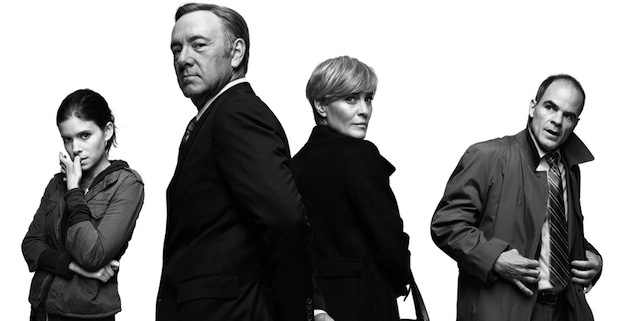
Series: House Of Cards
Star: Robin Wright, Kevin Spacey
Distributed by: Netflix
With the release of House of Cards, Netflix makes an impressive leap into the original programming game. Adapted by Beau Willimon (The Ides of March) from the early-‘90s BBC miniseries of the same name, and directed by a solid roster headlined by David Fincher, the first season is a deliciously tangled web of political, journalistic, and domestic intrigue. Tracing the complex revenge of House Majority Whip Frank Underwood (Kevin Spacey) after his promised Secretary of State position is given to a rival, its 13 episodes consistently crackle, but slack off significantly when focus shifts to Frank’s wife, Claire (Robin Wright).
Tonally analogous with The Ides of March’s slippery moral slope, Willimon’s follow-up likewise excels at establishing its central drama. Augmented by Frank’s mid-thought, direct audience addresses (a holdover from the BBC original), House of Cards presents its antihero as a wronged man seeking retribution for something rightfully his. Such empathy allows for greater acceptance of the actions he soon undertakes, an exceptional feat considering the despicable depths to which he descends. It also helps that an actor of Spacey’s talent and appeal is the one enacting this unsavory behavior, a superb casting choice that proves key to Frank’s insidious appeal.
The initial pieces in play, the series’ primary thrill lies in Frank accumulating naive souls in his pocket and the uncertainty of both when/if the design will come crashing down and which puppet will turn disloyal. Between the master classes in political doublespeak, candidates materialize in the form of Zoe Barnes (Kate Mara), the ambitious young journalist whose relationship with Frank extends from the front page to her bed; conniving lobbyist Remy Danton (Mahershala Ali), who just happens to be Frank’s former press secretary; and troubled young congressman-turned-patsy Peter Russo (Corey Stoll, in a heartbreaking performance), who steps up after Frank springs him from a DUI charge. Considering the numerous exploited parties on each rung of Washington’s power ladder, however, hits could come from anyone at any time, and in building up these myriad permutations, the series admirably delivers.
With Willimon’s hand in nearly every episode, House of Cards succeeds overall in maintaining its richness and steadily increasing the suspense, though not without a few missteps. Understandably firing its big guns from the start to inspire viewer loyalty, the trajectory of Frank’s revenge is more clear in the first two episodes (each directed by Fincher and written solely by Willimon). While this flood of crucial events hint at similar progress to come, the path becomes slightly obscured when focus shifts to Russo’s Underwood-approved bid for governor of Pennsylvania. An arc of comparatively high tension, its importance in the overall mission gradually grows clearer over its multi-episode spotlight, though the cloudiness of its sudden prioritization occasionally suggests that the series is losing its way.
Plaguing the story significantly more are the wealth of scenes involving Claire. The leader of an environmental activism group, her work occasionally overlaps with that of her husband, but the bulk of her personal and professional activity has little to do with House of Cards’ core interests. Though her position seemingly merits the second-billing attention she receives, the actual events and their significance to Frank’s master plan fail to warrant the generous screen time that’s allocated.
After a frustrating run of paltry scenes, however, a midpoint revelation of the Underwoods’ remarkably honest marriage makes Claire infinitely more appealing and dangerous. The writers quickly capitalize on this character rebirth to some degree in the episodes that follow and build to a lone exceptional twist, but are sadly just as quick to return Claire to her filler subplots. A rare missed opportunity amidst a wealth of intelligent supporting threads, the fumble wastes the appeal of Wright’s casting, though she nonetheless gives her all.
Wisely, the story remains foremost with Frank and the truly important parties either in the way of his goal or an accessory to its fulfillment. As the net tightens and surprises continue to emerge, not even the sudden unfounded rise of a background character can extinguish House of Cards’ spark. Released in its entirety on February 1 and quickly lapped up by Netflix’s Watch Instantly subscribers, the first season marks a brave leap forward in distribution and one sure to receive attention for its novel approach. Revolutionary access aside, the content more importantly lives up to the hype and star power far more often than it falters, and leaves viewers with enough progress and loose ends to warrant waiting for season two.
Grade: B
Review written by: Edwin Arnaudin
- 2015’s Most Underrated Films - December 29, 2015
- Passing The Torch: The End Of An Era For UTG - December 1, 2015
- UTG PREMIERE: Before The Streetlights – “Private Browser” - November 26, 2015

Comparatively, it is better than grade B because the look, feel and emotional content play onto the screen with one flip of the channel selector to CNN or MSNBC.